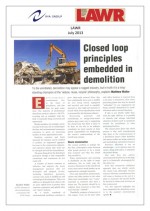RVA Group’s industry leading stance on all things environmental caught the eye of recycling magazine LAWR (Local Authority Waste and Recycling). Here we share with you the resulting article outlining Matthew Waller, RVA Group EHS manager’s, opinion on the extent to which the demolition industry has embraced the much-debated ‘closed loop’ concept.
To the uninitiated, demolition may appear a somewhat rugged industry, but in truth it is a structured discipline and long-standing champion of the ‘reduce, reuse, recycle’ philosophy. Environmental commitment lies at the heart of the industry, and has done for quite some time. The majority of professional demolition projects achieve a 96-97% recycling rate as standard, with the bulk of materials being recovered and reprocessed. Metals and glass for example can be recycled with ease, but as technologies develop and environmental awareness continues to grow, an increasing number of reuse opportunities exist too. Hardcore concrete and brick materials for instance can be crushed to produce an engineered aggregate for re-use in the construction industry, and expensive plastic pipe work can be salvaged and sold for reinstallation.
The great thing about the demolition profession though is that responsible consultants and contractors do not stand still. A number of factors continue to influence and improve the waste management practices that are developed and adopted on site including legislative pressures, external costs such as landfill tax and technological developments. This is in addition to demands from clients who are quite rightly keen to protect their corporate reputation and uphold their own ‘green’ policies.
As a result, standards of environmental excellence continue to grow. Man made mineral fibres that have traditionally been sent to landfill are now being sorted, segregated and recycled, and wood is carefully assessed so that high end material is re-used whilst lower-specification wood is processed for the biomass industry.
Recovering materials and contributing to energy from waste projects goes some way to supporting the closed loop, but there is more to be done. In our role as an industry consultant we must assume at least partial responsibility for heightening the discipline’s understanding of the exciting closed loop concept.
The current problem is perhaps the fact that a discrepancy exists between what people perceive to be a closed loop economy and what the closed loop actually is.
Waste minimisation and recycling is thankfully on the radar of many industries, but to truly reap the resource efficiencies of the closed loop, waste must move much further up an organisation’s strategic hierarchy.
Over time demolition professionals, clients and other parties in the value chain must increasingly view ‘waste’ materials as resources that have a future use. The priority should be to redeploy these resources so that they never become ‘rubbish’.
Thankfully, progress is being seen in this respect. Gone are the days when only office furniture is removed from a site prior to demolition. Now entire processing plants that may be deemed ‘redundant’ by one organisation are being carefully dismantled for resale, relocation and re-erection elsewhere. If this is not wholly viable then, with the right skill-set, it is possible to identify and salvage individual elements of plants such as equipment vessels for installation in other processing facilities.
The crucial point about this whole process is that such considerations take place at the commencement of a demolition project when feasibility and option studies are being conducted and methodology statements prepared. In other words, resource efficiency is not an afterthought – it is a priority from the outset. Along with safety, it underpins the project design. Not only does this achieve environmental benefits but in the large part it is financially advantageous for the client too.
Even this extensively considered approach does not wholly satisfy the closed loop philosophy, because resource efficiency considerations that will come to fruition at the end of a plant or structure’s life, should ideally be factored in when such facilities are first constructed. Yet, this approach highlights just how committed the demolition discipline is to the country’s environmental agenda – something the industry’s professionals have known for some time.












